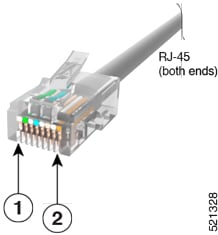LEDs
 Note |
The Cisco NCS 540 Router LEDs are similar for most of the variants, and any differences between the routers are specifically called out. |
Router LEDs
All the data port LEDs in the Cisco NCS 540 Router are at the front panel. There are five LEDs that reflect the different statuses of the system.
|
LED Label |
Color |
Status |
|---|---|---|
|
PS0 and PS1 |
Off |
This indicates that there is no AC or DC input. |
|
Red |
This indicates 12V output failure. If one of the input feeds is switched off when both the feeds are connected, then that particular feed shows as red. |
|
|
Green |
This indicates 12V output is active. |
|
|
STS |
Off |
the system is placed in shutdown mode; only standby power mode is available. |
|
Flashing Amber (Slow) |
The module is booting up. |
|
|
Flashing Amber (Fast) |
The module is booting up, shutting down, or is being reloaded. |
|
|
Amber |
Host kernel is booted and is ready to start SysAdmin VM. |
|
|
Green |
The module is operational and has no active major or critical alarms. |
|
|
Flashing Red |
The router has active major or critical alarms. |
|
|
ALM |
Off |
No alarm |
|
Red |
Critical alarm - system scope, critical temperature |
|
|
Flashing Red |
Critical alarm - Relating to voltage rail failures |
|
|
Amber |
Major alarm - system-scope |
|
|
Flashing Amber |
Minor alarm - system-scope |
|
|
SYNC |
Off |
Time core clock synchronization is disabled or in free-running state. |
|
Green |
Time core is synchronized to an external source including IEEE1588. |
|
|
Flashing Green |
System is in Synchronous Ethernet mode. |
|
|
Amber |
Acquiring state or Holdover: Time core is in acquiring state or holdover mode. |
Fan Assembly LEDs
|
LED Label |
Color |
Status |
|---|---|---|
|
FAN |
Off |
Sytem is powered off. |
|
Green |
Fans are operating normally. |
|
|
Amber |
Single fan failure |
|
|
Red |
More than one fan failure |
Power Status LEDs
|
LED Label |
Color |
Status |
|---|---|---|
|
PWR |
Off |
Sytem is powered off |
|
Green |
All the power supplies are on and operating normally. |
|
|
Amber |
Standby FPGA upgrade is in progress (this is expected to take about three to five minutes). |
|
|
Red |
Power redundancy is lost due to a power feed failure or an internal power supply failure. |
Combination of LEDs
|
FAN |
PWR |
Status |
|---|---|---|
|
For all the conditions below, the system will not boot. |
||
|
Flashing Red |
Flashing Red |
Thermal shutdown at Power Up |
|
Flashing Red |
Flashing Amber |
MSS Ready Failure |
|
Flashing Amber |
Flashing Green |
TAM Init Failure |
|
Flashing Amber |
Flashing Red |
TAM Ready Failure |
|
Flashing Amber |
Flashing Amber |
Secure JTAG Failure |
SFP SFP+ Port LED
|
LED Label |
Color |
Status |
|---|---|---|
|
STATUS |
Off |
Admin is down |
|
Green |
Link is up in 1G/10G ports. |
|
|
Yellow |
Fault or Error or Link Down |
Management Port LEDs
|
LED Label |
Color |
Status |
|---|---|---|
|
Left LED |
Green |
Link is up in 1000 Mbps |
|
Blinking Green |
Activity in 1000 Mbps |
|
|
Amber or Orange |
Link is up in 100/10Mbps |
|
|
Blinking Amber or Orange |
Activity in 100/10Mbps |
|
|
Off |
Link is down |
|
|
Right LED |
Green |
Link is up in full duplex |
|
Off |
Link is up in half duplex |


 Feedback
Feedback